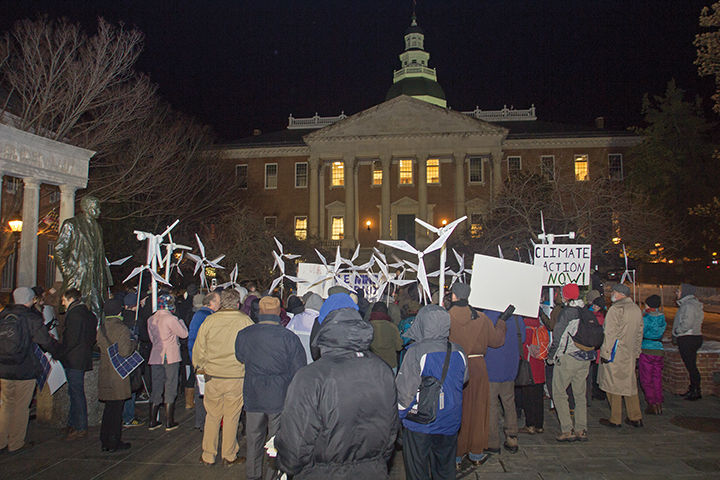
Students and members of the Chesapeake Climate Action Network rally outside the state building in Annapolis to lobby for a variety of bills regarding the environment on Monday, Feb. 23, 2015.
College students across the state convened in Annapolis yesterday afternoon to fight for stricter state environmental regulations.
About 45 college students — including about 25 from this university — lobbied representatives to vote in favor of a bill that would prevent any hydraulic fracturing, or fracking, in the state until 2023. They also showed their support for a bill that would increase the state’s use of renewable energy sources, said Maya Spaur, the Student Government Association Sustainability Committee governmental affairs director.
The group was brought together primarily by the Chesapeake Climate Action Network, a nonprofit organization fighting global warming in this state, Washington and Virginia.
“I’m really worried with Gov. [Larry] Hogan in the office,” said Spaur, a sophomore environmental science and technology and government and politics major. “So far, he’s blocked a lot of the environmental regulations, like phosphorus runoff in the bay. We can’t afford to keep holding off on regulations, we just don’t have time for that.”
Spaur served as this university’s campus coordinator for the student lobbying night, which also included students from University of Maryland, Baltimore County, Maryland Institute College of Art, Towson University and Goucher College, said Shilpa Joshi, the state’s campaign coordinator for the Chesapeake Climate Action Network.
Joshi briefed students about the status and details of the fracking bill and about lobbying. Then students split up to attend meetings with 33 legislators and dropped off information at representatives’ offices with whom they didn’t have meetings, Joshi said.
“Legislators really open up and really respond well to young people in their office,” Joshi said. “[It’s a] good change of pace from stuffy lobbyists. … [It’s] inspiring to see young people charged up on an issue.”
Sophomore computer science major Devin Ganey said he learned about the legislative process from lobbying for the first time.
“I learned a lot about fracking and about how the whole legislative process works in Maryland,” Ganey said. “It was cool to see how politicians get lobbied.”
However, some students on the trip had experience working with legislators, such as junior sociology major J.T. Stanley. He has lobbied in Annapolis for the University System of Maryland budget and in Prince George’s County for a bag tax. Stanley said lobbying against fracking is important because of the impact burning natural gas has on the environment, he said.
“I think it’s important to stop [fracking],” said Stanley, SGA Sustainability Committee member. “Methane is a more potent greenhouse gas emission than carbon. … All the projections get worse and worse on the consequences that will have on the globe.”
Students wanted to explain the science behind global warming to legislators because the fossil fuel industry can be misleading, Stanley said. They met with staff members from Senate President Thomas V. Mike Miller’s office as well as other representatives from across the state.
“We have the capability now to invest in green energy, green jobs, green infrastructure,” he said. “That’s why I think it’s important to come out. … Natural gas is not a transition fuel.”
The eight-year fracking moratorium bill, sponsored by Del. David Fraser-Hidalgo (D-Montgomery), is similar to New York Gov. Andrew Cuomo’s ban on fracking, which followed a six-year study on health implications from fracking.
“The great thing that New York did that we have to do is they looked at it from a public health perspective,” Fraser-Hidalgo said. “Public health is paramount. … It would be reckless for us to move forward without knowing more about the public health repercussions.”
CLARIFICATION: Maya Spaur is not the SGA’s Governmental Affairs director, but she is a governmental affairs director for its sustainability committee.



